- Home
- Warwick Deeping
Old Wine and New
Old Wine and New Read online
* A Distributed Proofreaders Canada eBook *
This eBook is made available at no cost and with very few restrictions. These restrictions apply only if (1) you make a change in the eBook (other than alteration for different display devices), or (2) you are making commercial use of the eBook. If either of these conditions applies, please contact a https://www.fadedpage.com administrator before proceeding. Thousands more FREE eBooks are available at https://www.fadedpage.com.
This work is in the Canadian public domain, but may be under copyright in some countries. If you live outside Canada, check your country's copyright laws. IF THE BOOK IS UNDER COPYRIGHT IN YOUR COUNTRY, DO NOT DOWNLOAD OR REDISTRIBUTE THIS FILE.
Title: Old Wine and New
Date of first publication: 1932
Author: Warwick Deeping (1877-1950)
Date first posted: Mar. 5, 2019
Date last updated: Mar. 5, 2019
Faded Page eBook #20190318
This eBook was produced by: Mardi Desjardins, Al Haines, Jen Haines & the online Distributed Proofreaders Canada team at https://www.pgdpcanada.net
Some famous novels by
WARWICK DEEPING
SORRELL AND SON
KITTY EXILE
THE TEN COMMANDMENTS
OLD PYBUS ROPER’S ROW
DOOMSDAY
Also by Mr. Deeping, an omnibus volume:
STORIES OF LOVE, COURAGE AND COMPASSION
and, in the Blue Jade Library:
UTHER AND IGRAINE
These are Borzoi Books published by
ALFRED A. KNOPF
OLD WINE AND NEW,
Copyright, 1932, by WARWICK DEEPING
All rights reserved—no part of this book may be reprinted in
any form without permission in writing from the publisher.
FIRST EDITION
Manufactured in the United States of America
Part One
Chapter One
The street was as black as a tunnel. An October night, fraught with the fatality of autumn, had covered everything with a flocculent raw darkness. The pavements and roadway were greasy, and a scattering of autumn leaves, blown from the trees of Spellthorn Square, adhered to the wet flagstones. Almost this little street in Chelsea had the smell of a dark cupboard that had not been opened for many weeks.
Scarsdale hesitated.
There were no lights, no people. The place was muffled up in a silence that was beyond being melancholy, for its very muteness suggested the acceptance of things as they are and not as they seem. A moment ago there had been the sound of footsteps in the street; a special constable had passed, yawning and glancing at the windows. Scarsdale, hesitant outside an iron gate, and knowing it to be a gate because the surreptitious shape of a cat had insinuated itself between the bars, had appealed to the “special”.
“I’m looking for Spellthorn Terrace.”
“This is Spellthorn Terrace.”
“Both sides?”
“No, these little houses.”
“You haven’t any idea, I suppose, which is 53?”
“No. Somewhere further along I should imagine.”
“Thanks. Good night.”
Scarsdale still hesitated. It was as though the long thin shape of him had got caught up in the darkness and in this wet spider’s-web of silence. He stood and stared at the row of houses, and their dim windows stared back at him. His hands were sunk deep in the pockets of his greatcoat. He had walked three miles to find Spellthorn Terrace, and now that he had found it he stood still and allowed himself to become submerged in melancholy. He was tired. The whole world was tired.
But he had come to find No. 53, and he opened a gate at a venture, walked up a flagged path between privet hedges, climbed three steps, and confronted a dark and anonymous door. Again he hesitated. Obviously the easiest solution would be for him to knock and inquire, but to Scarsdale life had somehow ceased to be easy and obvious. There had been so much noise, so much horror, so much raw flesh, and for two years he had been shedding illusions, and his illusions had been so much part of himself. He was forty-three, and at that age a man does not shed his leaves without a sense of perplexity and a feeling of nakedness. Everything was so strange, even the London that he knew so well. So many comfortable and familiar humanities had vanished.
But this blank and unhelpful door! He withdrew his right hand from the pocket of his greatcoat, and passed his fingers over the dark surface. He had long and sensitive fingers. It had occurred to him that the door might carry its numerals in brass or painted metal, and that he would be able to trace out the numbers with his finger-tips. He touched a knocker, and felt the hollow of a shallow moulding, but there were no raised numerals to be deciphered.
Well, why not knock and inquire? This idiotic groping! And for a moment he stood still and allowed himself a moment’s mental groping. His temperament was as sensitive as his fingers; it had suffered considerably; it had suffered more than his fingers. For the best part of three years he had been a brown figure in a crowd; he had been dressed, fed, paraded, inspected, ordered about, and all through those years he had felt something slipping from him. It was as though the war had torn away the shreds of his essential self. He had lost his initiative, his individuality. Removed from the crowd he was full of hesitations, vague perplexities, fears.
But what rot! He unbuttoned his greatcoat, and felt for a box of matches. He extracted a match, struck it, and holding box and match in the hollows of his hands and fingers, raised this lantern of the flesh toward the door. The flame lit up his big nose, and the brown eyes that were set rather like the eyes of a hare. He was grizzled at the temples. He was smiling a little whimsical, sad smile, and he did not realize it.
No. 57. He saw it in white upon a brown surface. He retreated. He closed the gate gently. He still continued to do things gently though the war was more than four years old, for he had been created to do things gently, and to love them so, books, china, English landscapes, routine. He had liked a nap after lunch on Sundays, and buttered toast in front of a fire.
Again he stood hesitant, fingering the matchbox. His hands symbolized his lack of grip, his fumbling, tentative fingering of newness. Should he count four doors to the left or to the right? He chose the right, and coming to the fourth gate in the low brick wall, he entered the gate, and climbed the steps. They were just like the other steps, with the same iron hand-rail and the same dark door. Scarsdale lit another match, and with the same conscientious carefulness raised the screened flame to the door.
No. 53. Marwood’s house! He blew out the match, dropped it, and was lost for a moment in other darkness, other memories.
2
An avenue of lime trees led from the high road to the red brick chateau occupied by C.C.S. No. 37. A colony of huts and of tents had gathered around this rococo country-house with its faked towers, and sleep slated roofs, and its imitation battlements. A high road lined with Lombardy poplars disappeared over the swelling bleakness of a ploughed hill.
Scarsdale lived in a tent. He was a nursing orderly at No. 37. He shared the tent with eight other men, and when it rained, a squdge of mud decorated the opening in the canvas. The tent was the last in the row, and nearest to the chateau gate where the motor ambulances swung in from the high road. They came and they went. They were so frequent that their wheels wore hollows in the roadway by the gate, and when these hollows were full of mud and water the cars would come lurching and squelching in between the two stone pillars.
Men were detailed to fill up the ruts and hollows with broken brick and cinder. It was done, and in a month the via Dolorosa needed more brick and cinder. The cars came and the cars went.
Scarsdale, when off duty, would sit on a ground-
sheet in the opening of the tent and stare at these cars. Never in his life had he done so much staring. It was as though he sat and stared while something happened to his soul. His eyes were the eyes of an animal, brown, staglike, dumb. His consciousness too had a muteness, an inarticulate, shocked wonder. It was as though some super-slaughterman had taken him and dealt him a blow that had stunned him without killing. He sat and stared; he saw things, horrible things, and unlike other men he had not grown dulled to the horror of them. It was as though the soul of him suffered daily from the same shock, the wounds that remained bleeding.
He sat and stared. To the other and cruder men he was something of an oddity. He seemed bemused, asleep. And at night he slept badly. They had known him to start awake shouting and struggling. He spoke gently, slowly, and seldom. He never went to the estaminet and got merry and tickled Josephine the fat little waitress. When not on duty he always appeared to be sitting and staring and meditating upon some strange problem that was never solved.
Yet there were two Scarsdales, the nursing orderly and the man who sat and stared. In the wards he was known as “Hands” or “Old Bossy” because when at work he was the best orderly in the Clearing Station. He had gentleness, a quite extraordinary gentleness, strength, tenderness of touch. When some particularly ghastly case had to be handled, that poor piece of pulp was fortunate if Scarsdale’s hands were there on duty. In bending to lift some poor devil his face had a kind of beauty.
3
It was a hot and stuffy night in August. The tent smelt of grey flannel shirts impregnated with sweat. Brown blankets had been tossed aside. Someone snored. In the high distance an aeroplane droned.
The tent was compelled back to consciousness by the sound of a man shouting. It turned over; it grumbled; it swore.
“What—the hell—!”
In the dimness of a summer dawn the tent became aware of “Hands” sitting naked to the waist, one arm extended and with a finger pointing. He had a strange, ashy look; his eyes stared, the lean, white body of him had a rigidity. His ribs stuck out.
He said very softly—“I say, you men, the war’s going on over there.”
The tent stared, propped upon elbows, raising tousled heads. There was a silence, incredulous, gathering invective. And Scarsdale, with that air of wide-eyed illumination, repeated the words.
“The war is going on over there.”
Someone reached for a boot. Obviously a man who woke up seven other men at three o’clock in the morning to tell them that the war was in progress, was asking for trouble. The boot missed Scarsdale’s head and flopped against the canvas.
“Why, you blasted fool—”
But Scarsdale was unmoved; he had a visionary look.
“I have never seen the war. I have been here two years. It is quite wrong. Don’t you agree with me that it is quite wrong?”
The tent, challenged, glowered upon him.
“Well, of all the blasted fools!”
“You’re damned lucky, my lad.”
“Why not take an afternoon off, old son, and go up and have shrimps and tea in the trenches?”
Scarsdale’s white figure remained motionless.
“That’s just what I’m going to do.”
“What!”
“You’re balmy. Lie down you blasted old idiot.”
In the half-light Scarsdale seemed to smile, and then very quietly he lay down and pulled up his blanket. He did not utter another word, and the tent with heavings and twistings and a sense of heat and disgust resettled itself in an atmosphere of stale shirt and army blanket. It had nothing more to say about Scarsdale, just as it had nothing more to say about the war. Both were bloody, and when you had used that adjective, the English language failed you.
But in Scarsdale something quivered, the spirit of him that had been submerged, the essential self that had sat dumb and distressed watching ambulances come and go. He had been wounded in living among wounds. He was not quite like those other men to whom the war had become a kind of habit, and who could look upon its wreckage with calm and accustomed eyes. Men grew callous; a self-protecting skin seemed to cover their souls. As an orderly Scarsdale had sometimes carried messages to the officers’ mess, and he remembered one particular night when the mess had been playing bridge. He had delivered his message.
“A bad case just come in, sir.”
The officer responsible had called three no trumps.
“All right.”
The game had gone on, and Scarsdale, somehow fascinated, had stood there with his glance glued to the four figures at the table. He had watched the cards played, and the intent faces of the players. He had marvelled, and yet what was there to marvel at? Ambulances came and ambulances went, and men must drink and play.
A voice had spoken sharply.
“Orderly.”
“Sir.”
“What are you waiting for?”
“Nothing, sir.”
“Well, clear out.”
He had cleared out with a sudden strange feeling of heat about the ears, for his ears had heard other words; “The damned fool standing there like a cataleptic.” Yet he wasn’t a damned fool, but a man hurt and a little bewildered, a man who had not been able to get on terms with the war, or to regard it as normal. Ambulances coming in, and ambulances going out; routine, the business of dealing with broken bodies. For these doctors did their job; they might drink whisky and tell smutty stories and make much noise, but in the wards and in the operating theatre they had keen eyes and careful hands. They had a devotion of their own, the practical man’s pride, his credo. When the war flared to some periodic, bloody climax, Scarsdale bemused with weariness, had watched these doctors working without sleep, until their faces grew all lined and grey and their eyes were sunken or stuck on stalks. The eyes of weary men behave differently.
Ambulances coming, ambulances going, squelching and rolling in at the muddy gate.
And suddenly Scarsdale had heard a cry, one of those inward cries that startle and shatter a man’s consciousness.
“Souls—souls! My god, not broken bodies, but broken souls!”
4
The war was both formal and informal. Scarsdale granted a pass for the day, fraternized with the R.A.M.C. orderly of an outgoing ambulance and was taken on board.
“Where do you want to go, chum?”
“Where are you going?”
“Menin Road dressing-station.”
“How far from the front line?”
The orderly looked at him curiously.
“Three or four miles. Bit lively just at present.”
“I want to go up to the trenches.”
“What for? To see a pal?”
“No, to see the war.”
“See the war. Gosh!”
There was no accounting for some people’s tastes.
The ambulance carried Scarsdale through Flanders. It was a very peaceful day with a large and spacious summer sky and a light breeze playing in the poplars. Corn was ripening. The spires of churches thrust slim grey wedges into the blue of the sky. Women and old men were working in the fields and Scarsdale looking back saw the landscape as in a frame enclosed by the canvas tilt of the ambulance.
They came to Poperinghe and passed through it and in the grey streets of that little Flemish town Scarsdale felt the first tremor of something. There were smashed houses, a sadness, a suggestion of fear. It was as though the town listened. Great poplars lined the road, and here and there the trees were broken; the fields had a shabby look.
The country grew more shabby and desolate. There were troops on the road, transport, guns. Scarsdale met the eyes of some of the marching men; they seemed to stare at him like mute animals, sullenly, stupidly. From somewhere came a rushing sound; and the roar of an explosion.
The orderly grinned.
“The old sod’s shelling the road. Long range. We’ve been pretty lucky lately.”
But Scarsdale noticed that the man’s face had changed. He was
a fair, blue-eyed lad, casual, talkative. Away there among the fields his face had seemed smooth and plump, but now it looked older; the lines of it had sharpened; the blue eyes were restless. It seemed to Scarsdale that this other man was listening, and that the drums of his own ears had suddenly grown tense.
He said, “There’s something different up here.”
The orderly stared at him.
“Different! I should say so. You’ve got to the part where there’s always the chance of a bloody mess.”
They passed through the lesser desolation that was Vlamertinghe and the greater desolation that was Ypres. The landscape was all jagged remnants, torn earth, rubbish, blasted trees. In the roadway near the Menin Gate, Scarsdale saw a splodge of blood in the road, and near it a dead horse. Some men were clearing away the wreckage of a smashed limber. There was a sudden metallic crash among some ruins close by, and rubbish and dust surged into the air. And Scarsdale felt a contraction of his stomach; his knees trembled a little. He found himself listening.
The orderly looked at him and laughed. Scarsdale wondered why the fellow laughed. He had been watching Scarsdale’s eyes coming out on stalks.
“Bit lively to-day.”
The ambulance drew up outside a row of doorways that appeared to give entrance to piles of broken brick and sandbagged shelters. R.A.M.C. men lounged uneasily. A stretcher with a body on it was being carried through a doorway under a rolled up gas-curtain. An officer came hurriedly from one bolt-hole and disappeared as hurriedly into another. Fifty yards up the road a volcanic gush of black dirt and smoke spurted into the air. Scarsdale had seen a yellow red glare in the centre of it. The crash of the explosion seemed to shake something inside him.

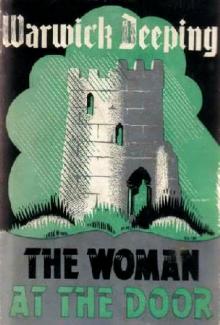 The Woman at The Door
The Woman at The Door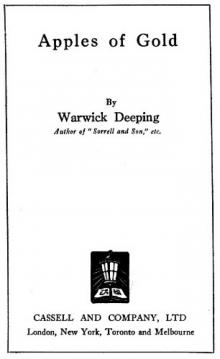 Apples of Gold
Apples of Gold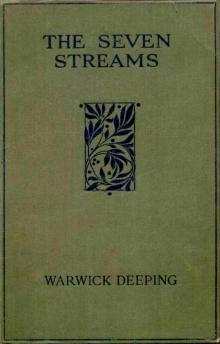 The Seven Streams
The Seven Streams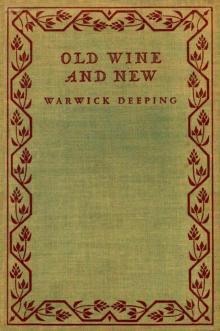 Old Wine and New
Old Wine and New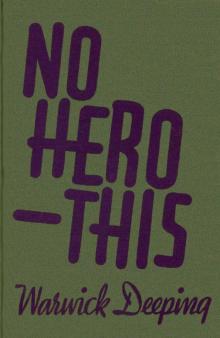 No Hero-This
No Hero-This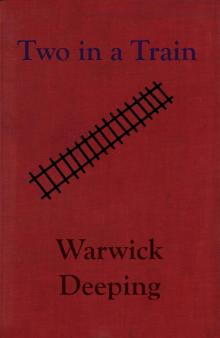 Two in a Train
Two in a Train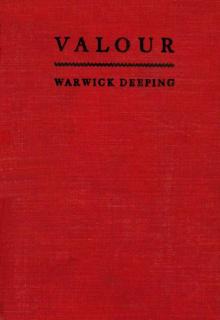 Valour
Valour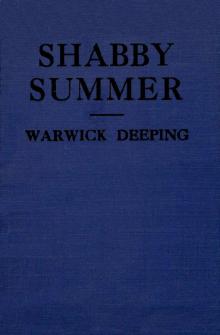 Shabby Summer
Shabby Summer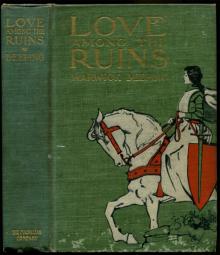 Love Among the Ruins
Love Among the Ruins The Short Stories of Warwick Deeping
The Short Stories of Warwick Deeping